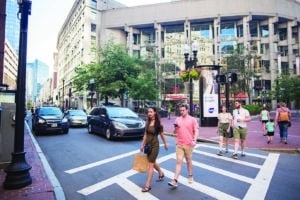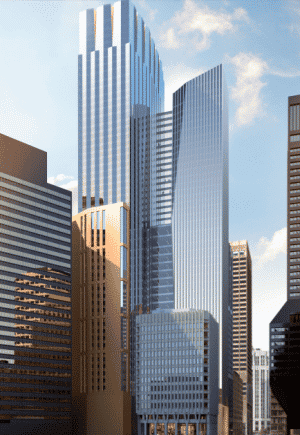
Over the past five years, downtown Boston building owners and developers have added 142 new shops, restaurants, fitness clubs and stores to the neighborhood. They could be the start of a wave that will make the area much more vibrant.
Think downtown Boston is already built out?
Well think again.
The Boston Planning & Development Agency this spring kicked off an intensive planning process to look at the future of downtown.
Sure, city planners – and a panel of dozens of downtown stakeholders and residents that will be providing advice – will be look at all sorts of things, from girding downtown for the challenges of climate change to public safety.
But the BPDA will also be looking hard at future growth in downtown which, despite being the most densely packed part of the city, still has substantial development potential, city planners say.
In fact, there is substantial, ongoing interest on the part of investors and developers in various sites and buildings across the neighborhood, according to Lauren Shurtleff, acting director of planning, and Kennan Rhyne, a senior planner focused on downtown.
While it may be hard to believe, this is the first time City Hall commissioned a planning study for Boston’s downtown as a whole.
You can be assured there are innumerable planning documents gathering dust in the BPDA’s files dealing with the various downtown neighborhoods, like the Financial District or Chinatown.
Gain Access to New England Premier Source for Real Estate Data
Real estate is a moving target, but with a valuable tool like RE Records Search in your arsenal, you can get a bullseye every time. The Warren Group is New England’s premier source for timely and accurate real estate data, and RE Records Search provides valuable insight to the region’s property characteristics, tax records, sales and mortgage histories, and foreclosure information.
But until now, there has been no effort to knit them all together.
Nothing happens in a vacuum, and City Hall’s interest in taking a deep dive on the future of downtown Boston comes as development interest in the area bubbles.
While declining to get into additional detail, the Shurtleff and Rhyne noted that garages, parking lots and aging, non-historic structures in need of a reboot are all being eyed.
Millennium Jump-Started Downtown
The new development interest comes even as construction continues apace on a number of potentially transformative projects downtown.
Leading the way is Millennium Partners, which has kicked off work on what will be the city’s fourth–tallest tower where the old, city-owned Winthrop Square parking garage once stood.
The $1.35 billion, 691–foot–tall office and condominium tower, with an expansive stretch of public space on the ground floor dubbed “the Connector,” is slated to open in 2022.
Not alone, Millennium’s Winthrop Square tower is just one of a bevy of new projects have stamped their imprint on downtown over the last two decades, creating residential pockets in what was once an area, with the exception of Chinatown, solely devoted to business and commerce.

Millennium’s Winthrop Square tower is just one of a bevy of new projects have stamped their imprint on downtown over the last two decades, creating residential pockets in what was once an area, with the exception of Chinatown, solely devoted to business and commerce.
Millennium Partners’ other big recent project, a certain 60-story luxury condo tower on Washington Street, has helped turn once–bedraggled Downtown Crossing into an up-and-coming new residential and retail destination.
Downtown Crossing alone – just one chunk of Boston’s core – now has more than 12,000 residents.
Life Growing in Sterile Financial District
The Financial District has also attracted billions in new investment over the past 20 years, with real estate operators doing their best to bring new life to one of Boston’s more sterile stretches, spiffing up office tower lobbies and brining in retail options.
A number of office and retail buildings in the Financial District, many dating from the late 19th early 20th century, have also found new life as boutique hotels, apartments and condos.
Broad Street, at the edge of the Financial District, is a prime example, with developers taking advantage of the street’s location next to the Greenway to turn its old office buildings and warehouses into a residential enclave.
City Hall has also gained a powerful ally in its efforts to inject new life into downtown with the launch a couple years ago of a business improvement district, or BID.
Financed by local building owners, the Downtown Boston Business Improvement District has a $5 million-plus annual budget to do everything from bring in performers and putting up planters to removing graffiti.
Over the past five years, downtown building owners and developers have added 142 new shops, restaurants, fitness clubs and stores to the neighborhood, totaling 1.8 million square feet.
Planners Have Challenge Ahead
But while this is all well and good, let’s get real – downtown Boston, especially the Financial District, remains a work in progress.
No one is about to mix up High Street in the Financial District with Boylston or Newbury streets in the Back Bay, which remains the most coveted neighborhood in the city, commanding the highest office rents – and for that matter, the highest condo prices – in the city.
The Back Bay is one of the world’s great urban neighborhoods, a prime example of what a mixed-use neighborhood should be. It is not only a place to do business, it is a place to live and shop, as well.

Scott Van Voorhis
Of course, public spaces and cultural treasures like the Boston Public Library, Copley Square and Trinity Church don’t hurt.
Boston’s planners certainly have their work cut out for them as they drill down into the future of downtown Boston.
The development momentum helping transform the neighborhood is real. That said, downtown has a long-way to go before it can truly be considered a mixed-use neighborhood if not on par with, then at least worthy of mention alongside Back Bay.
Scott Van Voorhis is Banker & Tradesman’s columnist; opinions expressed are his own. He may be reached at sbvanvoorhis@hotmail.com.




 |
| 
